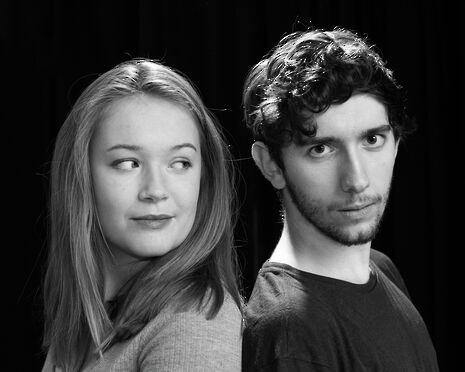Review: Measure for Measure
‘The finest actors that Cambridge has to offer’

The first play I ever saw in Cambridge was Measure for Measure, the 2013 CAST production on its home run at the ADC theatre. It remains, for me, one of the finest performances of a Shakespeare play I’ve ever seen; this year’s Marlowe Society production had a lot to live up to. Thankfully, there was very little to fault.
The overall reading of the play, made manifest mostly through the production’s design, was wonderful: we were transported to turn of the century Vienna; the Duke’s office became Freud’s study, his couch lifted up and omnipresent for the whole performance. A simple gesture, perhaps, but a Freudian language of repression, eroticism and desire was given pride of place throughout. Confessions took place on the couch instead of in the church; religion and sin intermingled with psychology and desire, a fine line never conspicuously drawn. Costumes were delightful and consistent; the Duke’s (Mark Milligan) transformation from royalty to monk was effective, with a strong, cohesive contrast of austere religious vestments and bourgeois garments.
Unsurprisingly, the direction, design and lighting were all fantastic, given the professionals in charge of those roles. The Arts Theatre itself provided a stark contrast to the ADC: the creative potential of the space was exponentially greater and utilised superbly. Atmospheric, subtle and detailed lighting permeated the show; sound design was similarly accomplished, with a marvellous score from Toby Marlow and creative soundscape effects from echoing to clock chimes.
The performances from all of the actors, in particular those given multiple roles, were strong and polished. The Bard’s prose flowed elegantly and was rarely lost; a few of the more poetic quotes could have been played up but this was far from distracting. For me, Alexandra Wetherell as Isabella stood out: fiercely independent, she raged with a passion amidst the scheming and manipulation of the men of power that surrounded her. Bea Svistunenko as Escalus and Kate Reid as the Provost similarly provided strong female characters, elegant counterpoints to the Duke and Angelo (Marco Young).
Throughout the first half, though, I couldn’t shake the thought that perhaps Milligan and Young would have both been better suited to the other’s part. The Duke had a sinister air around many of his actions; even at the end when his plans came to fruition, there was an unsettling side to him, something that Angelo lacked at times. Instead, he was often convincing in his morality and his assault on Isabella came as quite the surprise. Looking back on the performance as a whole, though, this could be seen to add another dimension: we were left not knowing who to trust, who had pure morals and who lacked them.
I found Raphael Wakefield’s Elbow, Aoife Kennan’s Pompey and Tom Beaven’s slimy and repugnant Lucio, each undeniably talented comic performers, to be overdone; ironically, Rosie Brown as Mistress Overdone was conversely underplayed. The comic, lighter elements of the play were sometimes exaggerated beyond necessity: from nowhere came humour, out of kilter with moments of serious drama.
At times, the pace of the play slowed, the stage stagnated. This was usually remedied speedily, albeit too often for my taste with slapstick or caricature. Nonetheless, I found myself eagerly captivated by most of the production, waiting for the moments of revelation that were built up to with more than sufficient tension. The Duke’s disrobing was cleverly staged within a choreographed brawl; the final tableau, meanwhile, left a phenomenal and original uncertainty in the air with the trinity of the Duke, Angelo and Isabella unresolved, posing as many questions as it answered.
A strong, captivating and engaging production, then, from the finest actors that Cambridge has to offer, Measure for Measure is well worth a trip to the Arts Theatre. It’s not perfect but it’s as professional a show as can be found on the Cambridge theatre scene and deserves a fitting audience.
 Features / Beyond reality checkpoint: local businesses risking being forced out by Cambridge’s tourism industry15 October 2025
Features / Beyond reality checkpoint: local businesses risking being forced out by Cambridge’s tourism industry15 October 2025 Comment / Bonnie Blue is the enemy, not the face, of female liberation13 October 2025
Comment / Bonnie Blue is the enemy, not the face, of female liberation13 October 2025 News / Cambridge climbs to third in world Uni rankings11 October 2025
News / Cambridge climbs to third in world Uni rankings11 October 2025 News / Join Varsity this Michaelmas13 October 2025
News / Join Varsity this Michaelmas13 October 2025 Features / How to spend a Cambridge summer12 October 2025
Features / How to spend a Cambridge summer12 October 2025









